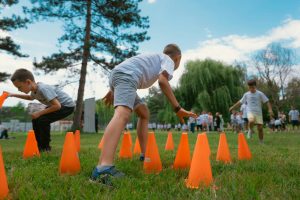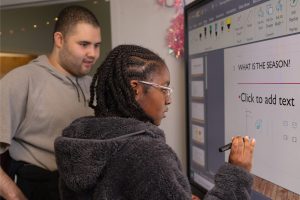blog
Blogs, articles, advice and more from the minds behind Gersh Autism Academy

blog
Understanding Different Teaching Methodologies in Autism Education: DIR/Floortime vs. ABA
As a parent of a child on the autism spectrum, you’ve likely faced more than your fair share of questions. What kind of environment helps my child thrive? What support will truly meet them where they are? And when it comes to therapy or teaching strategies, how do I choose…

blog
Moving Between Autism School Campuses: Gersh Autism Academy Transition Guide
Transitions in education are always significant, but when your child is on the autism spectrum, even a change between familiar settings can require extra care, planning, and support. One such transition occurs when a student completes their time at one Gersh Autism Academy campus—like our Queens location, which serves students…

blog
Public School to Autism School Transition: Complete Out-Of-District Placement Guides
For many families of children with autism, public school is the starting point. And for some, it works – at least for a while. But when your child isn’t making progress, when IEP goals remain unchanged year after year, or when supports are promised but not consistently delivered, it may…

blog
Transitioning to Kindergarten with Autism: Complete Parent Guide
Starting kindergarten is a big step for any child, but for children with autism and their families, it often comes with additional layers of planning, preparation, and emotion. New routines, new environments, and new expectations can all feel like a lot at once. But with the right support in place,…

blog
The IEP Process Explained: How to Advocate for Your Child’s Education
When your child diagnosed with autism is entering the school system for the first time, transitioning out of early intervention, or in the school system already but continuously struggling, the process to obtaining an IEP might feel complicated and overwhelming. You want to make sure they get the support they…

blog
Building a Support Network: Resources for Parents of Children with Autism
When your child is newly diagnosed with autism, it can feel like your world has suddenly changed. You might find yourself juggling therapy appointments, researching educational resources, and trying to make sense of what this diagnosis means for your child’s future. It’s a lot to handle, and it’s easy to…

blog
Sensory-Friendly Learning Environments: What Parents Should Look For
For children on the autism spectrum, the learning environment plays a powerful role in how well they can focus, participate, and feel comfortable at school. A classroom might look perfectly ordinary to most students, but to a child with sensory sensitivities, that same space can feel overwhelming, chaotic, or even…

blog
What to Do After an Autism Diagnosis: A Step-by-Step Guide for Parents
Receiving an autism diagnosis for your child can be a life-changing moment. You might remember the exact words the doctor used, the weight of the report in your hands, or the silence that followed as you tried to take it all in. For many parents, it’s a moment that feels…

blog
Understanding Autism Learning Styles: Setting the Right Educational Approach
Understanding Autism Learning Styles: Setting the Right Educational Approach For many parents of children with autism, choosing the right educational path can feel like trying to solve a puzzle without all the pieces. You want your child to feel safe, supported, and seen, but most importantly, you want them to…

blog
3 Tips to Encourage Your Young Adult with Autism to Try New Foods
As your child grows into adulthood, independence in daily life becomes more important, including the ability to make balanced food choices. But if your young adult with autism has a limited diet or strong food preferences, getting them to try something new can feel like an uphill battle. Food isn’t…

blog
The Role of Physical Activity in Supporting Emotional Regulation for Children with Autism
As a parent of a child with autism, you know that emotional regulation can be one of the biggest daily challenges. Whether it’s frustration over a change in routine, sensory overload, or difficulty expressing feelings, big emotions can take over fast. We have a lot of tools we use at…

blog
Using Technology to Support Executive Functioning Skills in Adults with Autism
Transitioning from high school to adulthood brings new responsibilities and expectations. For many autistic young adults, challenges with executive functioning, like time management, organization, and task completion, can make this transition overwhelming. The good news? Technology can be an extremely helpful tool in building independence, structure, and confidence in their…
Jose M.
As a parent of an autistic child, I can say that the care and dedication that teachers and staff give to their students is immeasurable. You can see it in the way my son looks forward to going to school every day, and in the growth and progress he has continuously shown throughout the years. Gersh really knows not only how to educate autistic children, but also acknowledge the personalities of each child, and embraces all facets of the student, showing and providing great care, patience, support and understanding for students and their families.
Brit A.
Every child needs only one person to believe in him. In Gersh, the entire team believes. They will find that one spark through positive reinforcement and this child will have confidence. My daughter entered Gersh when she was 10 years old. She did not know how to read. She now reads chapter books.
Jane R.
“Our daughter did not want to go school before Gersh, she was absent a lot. Within the first few months she developed a nice feeling of trust with the staff where she was very willing to go to school. They don’t reprimand or use a reward system they are all just warm and understanding which is what she needs and I think every child needs. Intellectually I see her flourishing because she is much less anxious so she’s able to concentrate better. We feel very fortunate to have found a nice safe, warm, inviting atmosphere for our daughter.”
Anthony M.
“At Gersh we feel like we are among family, like we are at home. We know that our son is comfortable, it is a very nurturing place. Academically he is flourishing and socially he is much more outgoing; more comfortable in his own skin and his surroundings. Since coming to Gersh he is more verbal. He used to give us one word answers and now he tells us what’s going on.”
Donna B.
“The teachers are great, they are able to customize the lessons towards the students strengths. There’s nothing better than seeing the excitement in the air, the smiles, creativeness and teamwork. Gersh gives the gift that keeps giving, “ENDLESS ADVENTURES.”
Jose R.
“You guys rock! I can’t imagine my son attending any other school. Thank you for everything” – Jose R.
